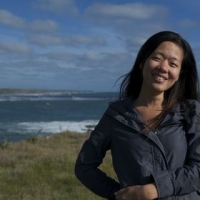Latest Sheet Music
Herbie Hancock

Herbert Jeffrey "Herbie" Hancock (born April 12, 1940) is an American pianist and composer. He is regarded not only as one of the greatest living jazz musicians, but also as one of the most influential jazz musicians of the 20th century. His music embraces elements of funk and soul while adopting freer stylistic elements from jazz. In his jazz improvisation, he possesses a unique creative blend of jazz, blues, and modern classical music, with harmonic stylings much like the styles of Claude Debussy and Maurice Ravel.
As part of Miles Davis's "second great quintet," Hancock helped redefine the role of a jazz rhythm section, and was one of the primary architects of the "post-bop" sound. Later, he was one of the first jazz musicians to embrace synthesizers and funk. Hancock's music is often melodic and accessible; he has had many songs "cross over" and achieved success among pop audiences.
Herbie's best-known solo works include "Cantaloupe Island," "Watermelon Man" (later performed by dozens of musicians, including bandleader Mongo Santamaria), "Maiden Voyage," "Chameleon," and the singles " I Thought It Was You" and "Rockit." His 2007 tribute album "River: The Joni Letters" won the 2007 Grammy Award for Album of the Year, only the second jazz album ever to win the award after 1965's Getz/Gilberto.
He is an adherent of the Nichiren school of Mahayana Buddhism.
As part of Miles Davis's "second great quintet," Hancock helped redefine the role of a jazz rhythm section, and was one of the primary architects of the "post-bop" sound. Later, he was one of the first jazz musicians to embrace synthesizers and funk. Hancock's music is often melodic and accessible; he has had many songs "cross over" and achieved success among pop audiences.
Herbie's best-known solo works include "Cantaloupe Island," "Watermelon Man" (later performed by dozens of musicians, including bandleader Mongo Santamaria), "Maiden Voyage," "Chameleon," and the singles " I Thought It Was You" and "Rockit." His 2007 tribute album "River: The Joni Letters" won the 2007 Grammy Award for Album of the Year, only the second jazz album ever to win the award after 1965's Getz/Gilberto.
He is an adherent of the Nichiren school of Mahayana Buddhism.
Arcangelo Corelli

Arcangelo Corelli (17 February 1653 – 8 January 1713) was an Italian violinist and composer of Baroque music.
Corelli was born at Fusignano, in the current-day province of Ravenna, although at the time it was in the province of Ferrara. Little is known about his early life. His master on the violin was Giovanni Battista Bassani. Matteo Simonelli, the well-known singer of the pope’s chapel, taught him composition.
He gained his first major success in Paris at the age of nineteen, and to this he owed his European reputation. From Paris, Corelli went to Germany. In 1681 he was in the service of the electoral prince of Bavaria; between 1680 and 1685 he spent a considerable time in the house of his friend and fellow violinist-composer Cristiano Farinelli (believed to be the uncle of the celebrated castrato Farinelli).
In 1685 Corelli was in Rome, where he led the festival performances of music for Queen Christina of Sweden, and he was also a favorite of Cardinal Pietro Ottoboni, grandnephew of another Cardinal Pietro Ottoboni, who in 1689 became Pope Alexander VIII. From 1689 to 1690 he was in Modena; the Duke of Modena was generous to him. In 1708 he returned to Rome, living in the palace of Cardinal Ottoboni. His visit to Naples, at the invitation of the king, took place in the same year.
The style of execution introduced by Corelli and preserved by his pupils, such as Francesco Geminiani, Pietro Locatelli, and many others, was of vital importance for the development of violin playing. It has been said that the paths of all of the famous violinist-composers of 18th-century Italy led to Arcangelo Corelli who was their "iconic point of reference." (Toussaint Loviko, in the program notes to Italian Violin Concertos, Veritas, 2003)
Corelli was born at Fusignano, in the current-day province of Ravenna, although at the time it was in the province of Ferrara. Little is known about his early life. His master on the violin was Giovanni Battista Bassani. Matteo Simonelli, the well-known singer of the pope’s chapel, taught him composition.
He gained his first major success in Paris at the age of nineteen, and to this he owed his European reputation. From Paris, Corelli went to Germany. In 1681 he was in the service of the electoral prince of Bavaria; between 1680 and 1685 he spent a considerable time in the house of his friend and fellow violinist-composer Cristiano Farinelli (believed to be the uncle of the celebrated castrato Farinelli).
In 1685 Corelli was in Rome, where he led the festival performances of music for Queen Christina of Sweden, and he was also a favorite of Cardinal Pietro Ottoboni, grandnephew of another Cardinal Pietro Ottoboni, who in 1689 became Pope Alexander VIII. From 1689 to 1690 he was in Modena; the Duke of Modena was generous to him. In 1708 he returned to Rome, living in the palace of Cardinal Ottoboni. His visit to Naples, at the invitation of the king, took place in the same year.
The style of execution introduced by Corelli and preserved by his pupils, such as Francesco Geminiani, Pietro Locatelli, and many others, was of vital importance for the development of violin playing. It has been said that the paths of all of the famous violinist-composers of 18th-century Italy led to Arcangelo Corelli who was their "iconic point of reference." (Toussaint Loviko, in the program notes to Italian Violin Concertos, Veritas, 2003)
Alexander Scriabin
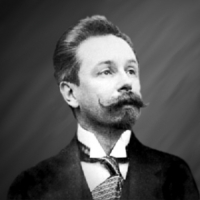
Alexander Nikolayevich Scriabin (/skriˈæbɪn/; Russian: Алекса́ндр Никола́евич Скря́бин; 6 January 1872 – 27 April 1915) was a Russian composer and pianist. Scriabin's early work is characterised by a lyrical and idiosyncratic tonal language influenced by Frédéric Chopin. Later in his career, independently of Arnold Schoenberg, Scriabin developed a substantially atonal and much more dissonant musical system, accorded to mysticism. Scriabin was influenced by synesthesia, and associated colors with the various harmonic tones of his atonal scale, while his color-coded circle of fifths was also influenced by theosophy. He is considered by some to be the main Russian Symbolist composer.
Scriabin was one of the most innovative and most controversial of early modern composers. The Great Soviet Encyclopedia said of Scriabin that, "No composer has had more scorn heaped or greater love bestowed..." Leo Tolstoy once described Scriabin's music as "a sincere expression of genius." Scriabin had a major impact on the music world over time, and influenced composers like Roy Agnew, Nikolai Roslavets, Sergei Prokofiev and Igor Stravinsky. Scriabin's importance in the Soviet musical scene, and internationally, drastically declined. "No one was more famous during their lifetime, and few were more quickly ignored after death." In the 1970s, for instance, there were only three recordings of his complete (published) sonatas. Yet Scriabin's work has steadily regained popularity in recent years.
Scriabin was one of the most innovative and most controversial of early modern composers. The Great Soviet Encyclopedia said of Scriabin that, "No composer has had more scorn heaped or greater love bestowed..." Leo Tolstoy once described Scriabin's music as "a sincere expression of genius." Scriabin had a major impact on the music world over time, and influenced composers like Roy Agnew, Nikolai Roslavets, Sergei Prokofiev and Igor Stravinsky. Scriabin's importance in the Soviet musical scene, and internationally, drastically declined. "No one was more famous during their lifetime, and few were more quickly ignored after death." In the 1970s, for instance, there were only three recordings of his complete (published) sonatas. Yet Scriabin's work has steadily regained popularity in recent years.
noah Bogosh

Skinny Puppy, the Vancouver industrial rock band that sent an invoice to the U.S. military for allegedly using its music in Guantanamo Bay, says it was “coached” in ways to potentially sue the U.S. Department of Defense for using its material illegally.
Vampire Knight

Yuki's oldest memory is that of a winter night, when she was attacked by a vampire and rescued by another. Ten years later, Yuki, the adopted daughter of the director of the Cross Academy, has grown up and now acts as a guardian of the Day Class.
Big O

Big O Musical artist EPs: Freiheit, Parking Violations EP (Instrumentals), MORE Genre: Latin Urbano, Hip-Hop/Rap
Songs Loco Contigo Loco Contigo · 2022Por Paloma Por Paloma (feat. Chael Produciendo) · 2019 Cotorra Por Aduana
Cotorra Por Aduana · 2021.
Songs Loco Contigo Loco Contigo · 2022Por Paloma Por Paloma (feat. Chael Produciendo) · 2019 Cotorra Por Aduana
Cotorra Por Aduana · 2021.
Liszt

Franz Liszt (October 22, 1811 – July 31, 1886) was a Hungarian composer, virtuoso pianist and teacher.
Liszt became renowned throughout Europe for his great skill as a performer; to this day, many consider him to have been the greatest pianist in history. He was also an important and influential composer, a notable piano teacher, a conductor who contributed significantly to the modern development of the art, and a benefactor to other composers and performers, notably Richard Wagner and Hector Berlioz.
As a composer, Liszt was one of the most prominent representatives of the "Neudeutsche Schule" ("New German School"). He left behind a huge and diverse oeuvre, in which he influenced his forward-looking contemporaries and anticipated some 20th-century ideas and trends. Some of his most notable contributions were the invention of the symphonic poem, developing the concept of thematic transformation as part of his experiments in musical form and making radical departures in harmony.
Liszt has most frequently been credited to have been the first pianist who gave concerts with programs consisting only of solo pieces. An example is a concert he gave on March 9, 1839, at the Palazzo Poli in Rome. Since Liszt could not find singers who — following the usual habit of the time — should have completed the program, he played four numbers all alone.
Liszt was a prolific composer. Most of his music is for the piano and much of it requires formidable technique.In his most famous and virtuosic works, he is the archetypal Romantic composer. Liszt pioneered the technique of thematic transformation, a method of development which was related to both the existing variation technique and to the new use of the Leitmotif by Richard Wagner. Liszt's piano works are usually divided into two classes. On the one hand, there are "original works", and on the other hand "transcriptions", "paraphrases" or "fantasies" on works by other composers.
Liszt became renowned throughout Europe for his great skill as a performer; to this day, many consider him to have been the greatest pianist in history. He was also an important and influential composer, a notable piano teacher, a conductor who contributed significantly to the modern development of the art, and a benefactor to other composers and performers, notably Richard Wagner and Hector Berlioz.
As a composer, Liszt was one of the most prominent representatives of the "Neudeutsche Schule" ("New German School"). He left behind a huge and diverse oeuvre, in which he influenced his forward-looking contemporaries and anticipated some 20th-century ideas and trends. Some of his most notable contributions were the invention of the symphonic poem, developing the concept of thematic transformation as part of his experiments in musical form and making radical departures in harmony.
Liszt has most frequently been credited to have been the first pianist who gave concerts with programs consisting only of solo pieces. An example is a concert he gave on March 9, 1839, at the Palazzo Poli in Rome. Since Liszt could not find singers who — following the usual habit of the time — should have completed the program, he played four numbers all alone.
Liszt was a prolific composer. Most of his music is for the piano and much of it requires formidable technique.In his most famous and virtuosic works, he is the archetypal Romantic composer. Liszt pioneered the technique of thematic transformation, a method of development which was related to both the existing variation technique and to the new use of the Leitmotif by Richard Wagner. Liszt's piano works are usually divided into two classes. On the one hand, there are "original works", and on the other hand "transcriptions", "paraphrases" or "fantasies" on works by other composers.
Roxette

Roxette is a Swedish pop duo, consisting of Marie Fredriksson and Per Gessle.
Although well known as a duo in their native Sweden since the mid 1980s (where the group has had 17 Top 10 hits), the duo achieved worldwide success in the late 1980s. Roxette had four US No. 1 singles, two No. 2 singles. The group has been certified by the Recording Industry Association of America (RIAA) with two platinum albums - 1988's Look Sharp! (released in the U.S. in 1989) and 1991's Joyride, as well as two gold singles - "The Look" and "It Must Have Been Love".
Roxette's success was even bigger in Europe and South America, where their number of Top 10 hits was higher and continued after their decline in the US in 1992. Each of their 7 studio albums as well as their several "Best of" CDs received gold, platinum or multi-platinum status in Europe and Latin-America.
Although well known as a duo in their native Sweden since the mid 1980s (where the group has had 17 Top 10 hits), the duo achieved worldwide success in the late 1980s. Roxette had four US No. 1 singles, two No. 2 singles. The group has been certified by the Recording Industry Association of America (RIAA) with two platinum albums - 1988's Look Sharp! (released in the U.S. in 1989) and 1991's Joyride, as well as two gold singles - "The Look" and "It Must Have Been Love".
Roxette's success was even bigger in Europe and South America, where their number of Top 10 hits was higher and continued after their decline in the US in 1992. Each of their 7 studio albums as well as their several "Best of" CDs received gold, platinum or multi-platinum status in Europe and Latin-America.
Adele

Adele Laurie Blue Adkins (born 5 May 1988 in Enfield, North London), She is the first recipient of the Brit Awards Critics' Choice, which was given to artists who, at the time, had yet to release an album. She debuted at number one with her Mercury Prize nominated debut album 19 in the UK album chart and has since then been certified platinum with sales over 500,000 copies.
Incognito

Incognito is a British acid jazz band. Their debut album, Jazz Funk, was released in 1981. Jean-Paul 'Bluey' Maunick is the band's leader, singer, guitarist, composer, and record producer.
Christina Aguilera

Christina María Aguilera (born December 18, 1980) is an American R&B/pop singer and songwriter. She was signed to RCA Records after recording "Reflection" A Latin pop album, Mi Reflejo, and several collaborations followed which garnered Aguilera worldwide success, but she was displeased with the lack of input in her music and image.
After parting from her management, Aguilera took creative control over her second studio album Stripped (2002), Aguilera's third studio album Back to Basics (2006), included elements of soul, jazz, and blues music, and was released to positive critical reception.
Aguilera is currently in the studio working on her forthcoming album. Aguilera's work has earned her numerous awards including five Grammy Awards amongst eighteen nominations. She has become one of the most successful recording artists of the decade, racking up sales of more than 37 million albums worldwide.
After parting from her management, Aguilera took creative control over her second studio album Stripped (2002), Aguilera's third studio album Back to Basics (2006), included elements of soul, jazz, and blues music, and was released to positive critical reception.
Aguilera is currently in the studio working on her forthcoming album. Aguilera's work has earned her numerous awards including five Grammy Awards amongst eighteen nominations. She has become one of the most successful recording artists of the decade, racking up sales of more than 37 million albums worldwide.
Ben Folds

Benjamin Scott Folds (born September 12, 1966 in Winston-Salem, North Carolina) is an American singer and pianist. He originally gained fame as a member of the rock band, Ben Folds Five. Ben has released three solo albums: Fear of Pop: Volume 1, Rockin' the Suburbs, and Ben Folds Live. Fear of Pop was released while Ben Folds Five were still together; Suburbs and Live were released afterwards. Since Fear of Pop is highly experimental and Live is a collection of live solo recordings of mostly songs originally recorded with Ben Folds Five, Rockin' the Suburbs is Ben's first proper solo release. In late 2003 two solo EPs: Speed Graphic and Sunny 16 were released, with a third entitled Super D released in mid-2004. He currently resides in Adelaide, Australia with his wife, Frally Hynes, and two children, Louis and Grace. He tours Japan and the United States, as well as other parts of the world periodically.
Folds also produced and arranged the most recent William Shatner album, Has Been (2004); he previously worked with Shatner on the songs 'In Love' and 'Still in Love' for Fear of Pop.
Folds described his former band, Ben Folds Five, as 'punk rock for sissies,' and his oddball lyrics often contain nuances of depression, melancholy and self-conflict. While he was with the band Ben Folds Five and since his departure, Folds also provided a number of songs for films soundtrack. Some of these include 'Lonely Christmas Eve' for the film How the Grinch Stole Christmas! (2000) and a rendition of the Beatles' 'Golden Slumbers' for the film I Am Sam (2001).
On a planned tour of Australia, Folds teamed up with fellow namesakes Ben Kweller and Ben Lee to travel the country together as The Bens, at the suggestion of a fan on Ben Kweller's official website. The trio also went on to record an four-track EP together, entitled The Bens.
In summer of 2004, Folds co-headlined an American tour with fellow rockers Rufus Wainwright and Guster. His fourth solo album entitled 'Songs for Silverman' is slated for release on April 26, 2005.
Folds also produced and arranged the most recent William Shatner album, Has Been (2004); he previously worked with Shatner on the songs 'In Love' and 'Still in Love' for Fear of Pop.
Folds described his former band, Ben Folds Five, as 'punk rock for sissies,' and his oddball lyrics often contain nuances of depression, melancholy and self-conflict. While he was with the band Ben Folds Five and since his departure, Folds also provided a number of songs for films soundtrack. Some of these include 'Lonely Christmas Eve' for the film How the Grinch Stole Christmas! (2000) and a rendition of the Beatles' 'Golden Slumbers' for the film I Am Sam (2001).
On a planned tour of Australia, Folds teamed up with fellow namesakes Ben Kweller and Ben Lee to travel the country together as The Bens, at the suggestion of a fan on Ben Kweller's official website. The trio also went on to record an four-track EP together, entitled The Bens.
In summer of 2004, Folds co-headlined an American tour with fellow rockers Rufus Wainwright and Guster. His fourth solo album entitled 'Songs for Silverman' is slated for release on April 26, 2005.
Kansas
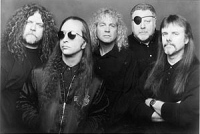
Kansas is an American progressive rock band which became a popular arena rock group in the 1970s, with hit singles such as "Carry On Wayward Son" and "Dust in the Wind". Kansas has remained a classic rock radio staple and a popular touring act in North America and Europe.
Final Fantasy
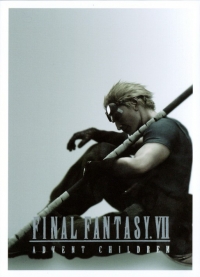
Final Fantasy (ファイナルファンタジー?) is a media franchise created by Hironobu Sakaguchi, and is developed and owned by Square Enix (formerly Squaresoft). The franchise centers on a series of fantasy and science-fantasy console role-playing games (RPGs), but includes motion pictures, anime, printed media, and other merchandise. The series began in 1987 as an eponymous video game developed to save Square from bankruptcy; the game was a success and spawned sequels. The video game series has since branched into other genres such as tactical role-playing, action role-playing, massively multiplayer online role-playing, and racing.
Although most Final Fantasy installments are independent stories with various different settings and main characters, they feature common elements that define the franchise. Such recurring elements include plot themes, character names, and game mechanics. Plots center on a group of heroes battling a great evil while exploring the characters' internal struggles and relationships. Character names are often derived from the history, languages, and mythologies of cultures worldwide.
The series has been commercially and critically successful; it is Square Enix's best selling video game franchise, with more than 85 million units sold, and one of the best-selling video game franchises. It was awarded a star on the Walk of Game in 2006, and holds seven Guinness World Records in the Guinness World Records Gamer's Edition 2008. The series is well known for its innovation, visuals, and music, such as the inclusion of full motion videos, photo-realistic character models, and orchestrated music by Nobuo Uematsu. Final Fantasy has been a driving force in the video game industry. The video game series has affected Square's business practices and its relationships with other video game developers. It has also introduced many features now common in console RPGs and has been credited with helping to popularize RPGs in markets outside Japan.
Although most Final Fantasy installments are independent stories with various different settings and main characters, they feature common elements that define the franchise. Such recurring elements include plot themes, character names, and game mechanics. Plots center on a group of heroes battling a great evil while exploring the characters' internal struggles and relationships. Character names are often derived from the history, languages, and mythologies of cultures worldwide.
The series has been commercially and critically successful; it is Square Enix's best selling video game franchise, with more than 85 million units sold, and one of the best-selling video game franchises. It was awarded a star on the Walk of Game in 2006, and holds seven Guinness World Records in the Guinness World Records Gamer's Edition 2008. The series is well known for its innovation, visuals, and music, such as the inclusion of full motion videos, photo-realistic character models, and orchestrated music by Nobuo Uematsu. Final Fantasy has been a driving force in the video game industry. The video game series has affected Square's business practices and its relationships with other video game developers. It has also introduced many features now common in console RPGs and has been credited with helping to popularize RPGs in markets outside Japan.
Roland bouthiller
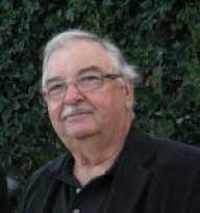
Traditional Music & Songs of the Channel Islands by Yvon Davy, Éva Guillorel, Étienne Lagrange, and Robert Bouthillier and translated by Roland Scales.
Handel

George Frideric Handel (Friday, 23 February 1685 - Saturday, 14 April 1759) was a German-born Baroque composer who is famous for his operas, oratorios and concerti grossi. Born as Georg Friedrich Handel in Halle, he spent most of his adult life in England, becoming a subject of the British crown on 22 January 1727. His most famous works are Messiah, an oratorio set to texts from the King James Bible; Water Music; and Music for the Royal Fireworks. Strongly influenced by the techniques of the great composers of the Italian Baroque and the English composer Henry Purcell, his music was known to many significant composers who came after him, including Haydn, Mozart, and Beethoven.
Handel's compositions include 42 operas; 29 oratorios; more than 120 cantatas, trios and duets; numerous arias; chamber music; a large number of ecumenical pieces; odes and serenatas; and sixteen organ concerti. His most famous work, the Messiah oratorio with its "Hallelujah" chorus, is among the most popular works in choral music and has become a centerpiece of the Christmas season. Also popular are the Opus 3 and 6 Concerti Grossi, as well as "The Cuckoo and the Nightingale", in which birds are heard calling during passages played in different keys representing the vocal ranges of two birds. Also notable are his sixteen keyboard suites, especially The Harmonious Blacksmith.
Handel introduced various previously uncommon musical instruments in his works: the viola d'amore and violetta marina (Orlando), the lute (Ode for St. Cecilia's Day), three trombones (Saul), clarinets or small high cornets (Tamerlano), theorbo, French horn (Water Music), lyrichord, double bassoon, viola da gamba, bell chimes, positive organ, and harp (Giulio Cesare, Alexander's Feast).
Handel's compositions include 42 operas; 29 oratorios; more than 120 cantatas, trios and duets; numerous arias; chamber music; a large number of ecumenical pieces; odes and serenatas; and sixteen organ concerti. His most famous work, the Messiah oratorio with its "Hallelujah" chorus, is among the most popular works in choral music and has become a centerpiece of the Christmas season. Also popular are the Opus 3 and 6 Concerti Grossi, as well as "The Cuckoo and the Nightingale", in which birds are heard calling during passages played in different keys representing the vocal ranges of two birds. Also notable are his sixteen keyboard suites, especially The Harmonious Blacksmith.
Handel introduced various previously uncommon musical instruments in his works: the viola d'amore and violetta marina (Orlando), the lute (Ode for St. Cecilia's Day), three trombones (Saul), clarinets or small high cornets (Tamerlano), theorbo, French horn (Water Music), lyrichord, double bassoon, viola da gamba, bell chimes, positive organ, and harp (Giulio Cesare, Alexander's Feast).
Duke Ellington

Edward Kennedy "Duke" Ellington (April 29, 1899 â May 24, 1974) was an American composer, pianist, and bandleader.
Recognized during his life as one of the most influential figures in jazz, if not in all American music, Ellington's reputation has increased since his death, including a special award citation from the Pulitzer Prize Board.
Ellington called his style and sound "American Music" rather than jazz, and liked to describe those who impressed him as "beyond category", including many of the musicians who served with his orchestra, some of whom were themselves considered among the giants of jazz and remained with Ellington's orchestra for decades. While many were noteworthy in their own right, it was Ellington that melded them into one of the most well-known orchestral units in the history of jazz. He often composed specifically for the style and skills of these individuals, such as "Jeep's Blues" for Johnny Hodges, "Concerto for Cootie" ("Do Nothing Till You Hear from Me") for Cootie Williams and "The Mooche" for Tricky Sam Nanton. He also recorded songs written by his bandsmen, such as Juan Tizol's "Caravan" and "Perdido" which brought the "Spanish Tinge" to big-band jazz. After 1941, he frequently collaborated with composer-arranger Billy Strayhorn, who he called his alter-ego.
One of the twentieth century's best-known African-American celebrities, Ellington recorded for many American record companies, and appeared in several films. Ellington and his orchestra toured the United States and Europe regularly before and after World War II. Ellington led his band from 1923 until his death in 1974. His son Mercer Ellington took over the band until his death from cancer in 1996. Paul Ellington, Mercer's youngest son, took over the Orchestra from there and after his mother's passing took over the Estate of Duke and Mercer Ellington.
Recognized during his life as one of the most influential figures in jazz, if not in all American music, Ellington's reputation has increased since his death, including a special award citation from the Pulitzer Prize Board.
Ellington called his style and sound "American Music" rather than jazz, and liked to describe those who impressed him as "beyond category", including many of the musicians who served with his orchestra, some of whom were themselves considered among the giants of jazz and remained with Ellington's orchestra for decades. While many were noteworthy in their own right, it was Ellington that melded them into one of the most well-known orchestral units in the history of jazz. He often composed specifically for the style and skills of these individuals, such as "Jeep's Blues" for Johnny Hodges, "Concerto for Cootie" ("Do Nothing Till You Hear from Me") for Cootie Williams and "The Mooche" for Tricky Sam Nanton. He also recorded songs written by his bandsmen, such as Juan Tizol's "Caravan" and "Perdido" which brought the "Spanish Tinge" to big-band jazz. After 1941, he frequently collaborated with composer-arranger Billy Strayhorn, who he called his alter-ego.
One of the twentieth century's best-known African-American celebrities, Ellington recorded for many American record companies, and appeared in several films. Ellington and his orchestra toured the United States and Europe regularly before and after World War II. Ellington led his band from 1923 until his death in 1974. His son Mercer Ellington took over the band until his death from cancer in 1996. Paul Ellington, Mercer's youngest son, took over the Orchestra from there and after his mother's passing took over the Estate of Duke and Mercer Ellington.
Gustav Holst

Gustav Theodore Holst (21 September 1874 – 25 May 1934) was an English composer and was a music teacher for nearly 20 years. He is most famous for his orchestral suite The Planets. Having studied at the Royal College of Music in London, his early work was influenced by Ravel, Grieg, Richard Strauss, and fellow student Ralph Vaughan Williams, but most of his music is highly original, with influences from Hindu spiritualism and English folk tunes. Holst's music is well known for unconventional use of metre and haunting melodies.
Holst wrote almost 200 catalogued compositions, including orchestral suites, operas, ballets, concertos, choral hymns, and songs (see Selected works below).
Holst became music master at St Paul's Girls' School in 1905 and director of music at Morley College in 1907, continuing in both posts until retirement.
He was the brother of Hollywood actor Ernest Cossart and father of the composer and conductor Imogen Holst, who wrote a biography of him in 1938.
Holst wrote almost 200 catalogued compositions, including orchestral suites, operas, ballets, concertos, choral hymns, and songs (see Selected works below).
Holst became music master at St Paul's Girls' School in 1905 and director of music at Morley College in 1907, continuing in both posts until retirement.
He was the brother of Hollywood actor Ernest Cossart and father of the composer and conductor Imogen Holst, who wrote a biography of him in 1938.
Giovanni Battista Pergolesi
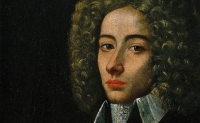
Giovanni Battista Pergolesi (4 January 1710 – 16 to 17 March 1736) was an Italian composer, violinist and organist.
Born at Jesi, Pergolesi studied music there under a local musician, Francesco Santini, before going to Naples in 1725, where he studied under Gaetano Greco and Francesco Feo among others. He spent most of his brief life working for aristocratic patrons like the Colonna principe di Stigliano, and duca Marzio IV Maddaloni Carafa.
Pergolesi was one of the most important early composers of opera buffa (comic opera). His opera seria, Il prigionier superbo, contained the two act buffa intermezzo, La Serva Padrona (The Servant Mistress, August 28, 1733), which became a very popular work in its own right. When it was performed in Paris in 1752, it prompted the so-called Querelle des Bouffons ("quarrel of the comedians") between supporters of serious French opera by the likes of Jean-Baptiste Lully and Jean-Philippe Rameau and supporters of new Italian comic opera. Pergolesi was held up as a model of the Italian style during this quarrel, which divided Paris's musical community for two years.
Born at Jesi, Pergolesi studied music there under a local musician, Francesco Santini, before going to Naples in 1725, where he studied under Gaetano Greco and Francesco Feo among others. He spent most of his brief life working for aristocratic patrons like the Colonna principe di Stigliano, and duca Marzio IV Maddaloni Carafa.
Pergolesi was one of the most important early composers of opera buffa (comic opera). His opera seria, Il prigionier superbo, contained the two act buffa intermezzo, La Serva Padrona (The Servant Mistress, August 28, 1733), which became a very popular work in its own right. When it was performed in Paris in 1752, it prompted the so-called Querelle des Bouffons ("quarrel of the comedians") between supporters of serious French opera by the likes of Jean-Baptiste Lully and Jean-Philippe Rameau and supporters of new Italian comic opera. Pergolesi was held up as a model of the Italian style during this quarrel, which divided Paris's musical community for two years.
John Rutter
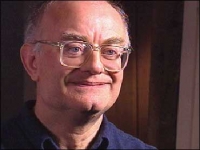
John Milford Rutter CBE (born 24 September 1945) is a British composer, conductor, editor, arranger and record producer, mainly of choral music.
Oliver!
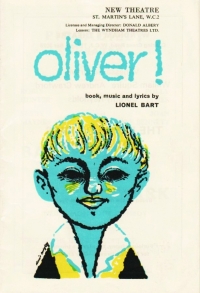
Oliver! is a British musical, with music and lyrics by Lionel Bart. It first appeared in the West End in 1960, enjoying a long run, and was made into a film directed by Carol Reed in 1968.
The musical is loosely based upon the novel Oliver Twist by Charles Dickens. That it was the first musical adaptation of a Charles Dickens work to become a stage hit was one of the reasons why it attracted such attention. There had been two previous Dickens musicals in the 1950s, both of them television adaptations of A Christmas Carol, but the dramatic story of Oliver Twist was the first Dickens work to be presented as a successful stage musical. Another reason for the success of the musical was the revolving stage set, an innovation designed by Sean Kenny.
The show launched the careers of several child actors, including Davy Jones, later of The Monkees; Phil Collins, later of Genesis; and Tony Robinson, who later played the role of Baldrick in the television series Black Adder. The singer Steve Marriott (Small Faces, Humble Pie) also featured in early line-ups, eventually graduating to the role of Artful Dodger in the West End production.
The plot of Dickens's original novel is considerably simplified for the purposes of the musical, with Fagin being represented more as a comic character than as a villain, and large portions of the latter part of the story being completely left out. Although Dickens' novel has been called antisemitic in its portrayal of the Jew Fagin as evil, the production by Bart (himself a Jew) featured many Jewish actors in leading roles: Ron Moody (Ronald Moodnik), Georgia Brown (Lilian Klot), and Martin Horsey.
The musical is loosely based upon the novel Oliver Twist by Charles Dickens. That it was the first musical adaptation of a Charles Dickens work to become a stage hit was one of the reasons why it attracted such attention. There had been two previous Dickens musicals in the 1950s, both of them television adaptations of A Christmas Carol, but the dramatic story of Oliver Twist was the first Dickens work to be presented as a successful stage musical. Another reason for the success of the musical was the revolving stage set, an innovation designed by Sean Kenny.
The show launched the careers of several child actors, including Davy Jones, later of The Monkees; Phil Collins, later of Genesis; and Tony Robinson, who later played the role of Baldrick in the television series Black Adder. The singer Steve Marriott (Small Faces, Humble Pie) also featured in early line-ups, eventually graduating to the role of Artful Dodger in the West End production.
The plot of Dickens's original novel is considerably simplified for the purposes of the musical, with Fagin being represented more as a comic character than as a villain, and large portions of the latter part of the story being completely left out. Although Dickens' novel has been called antisemitic in its portrayal of the Jew Fagin as evil, the production by Bart (himself a Jew) featured many Jewish actors in leading roles: Ron Moody (Ronald Moodnik), Georgia Brown (Lilian Klot), and Martin Horsey.
Gundam Seed Destiny

Mobile Suit Gundam SEED Destiny (機動戦士ガンダムSEED DESTINY Kidō Senshi Gandamu Shīdo Desutinī?) is the second anime television series set in the Cosmic Era universe of Gundam by Sunrise. Set two years after the original Mobile Suit Gundam SEED, Gundam SEED Destiny features many new characters and some returning ones. The series spanned 50 episodes (plus a recap episode entitled "Edited"), aired in Japan from October 9, 2004 to October 1, 2005 at 6:00 p.m. on the JNN TV stations TBS and MBS. The series won the Animage Anime Grand Prix prize in 2004 and 2005.
Mario Lanaro
Mario Lanaro (Malo, 1957) is an Italian choir director and composer.Mario Lanaro is an organist (a pupil of Renzo Buja), choir and orchestra conductor. He teaches at the Verona Conservatory (since 1993 he has held the chair of Choral Practice) , after having taught in the conservatories of Rovigo, Trento and Riva del Garda.At a very young age he began his career as a choir director, achieving four victories at the national choral competitions of Vittorio Veneto, Adria and Ivrea with the Valleogra di Schio Choral Group, which he conducted from 1975 to 1981, before the age of twenty.
George Gershwin

George Gershwin (September 26, 1898 – July 11, 1937) was an American composer. He wrote most of his vocal and theatrical works in collaboration with his elder brother, lyricist Ira Gershwin. George Gershwin composed songs both for Broadway and for the classical concert hall. He also wrote popular songs with success.
Many of his compositions have been used on television and in numerous films, and many became jazz standards. The jazz singer Ella Fitzgerald recorded many of the Gershwins' songs on her 1959 Gershwin Songbook (arranged by Nelson Riddle). Countless singers and musicians have recorded Gershwin songs, including Fred Astaire, Louis Armstrong, Al Jolson, Bobby Darin, Art Tatum, Bing Crosby, Janis Joplin, John Coltrane, Frank Sinatra, Billie Holiday, Sam Cooke, Miles Davis, Herbie Hancock, Madonna, Judy Garland, Julie Andrews, Barbra Streisand, Marni Nixon, Natalie Cole, Patti Austin, Nina Simone, Maureen McGovern, John Fahey, The Residents, Than & Sam, Sublime, and Sting. A residential building is named after him on the Stony Brook University campus.
Many of his compositions have been used on television and in numerous films, and many became jazz standards. The jazz singer Ella Fitzgerald recorded many of the Gershwins' songs on her 1959 Gershwin Songbook (arranged by Nelson Riddle). Countless singers and musicians have recorded Gershwin songs, including Fred Astaire, Louis Armstrong, Al Jolson, Bobby Darin, Art Tatum, Bing Crosby, Janis Joplin, John Coltrane, Frank Sinatra, Billie Holiday, Sam Cooke, Miles Davis, Herbie Hancock, Madonna, Judy Garland, Julie Andrews, Barbra Streisand, Marni Nixon, Natalie Cole, Patti Austin, Nina Simone, Maureen McGovern, John Fahey, The Residents, Than & Sam, Sublime, and Sting. A residential building is named after him on the Stony Brook University campus.
Beethoven

Ludwig van Beethoven (16 December 1770 - 26 March 1827) was a German composer and pianist. He was a crucial figure in the transitional period between the Classical and Romantic eras in Western classical music, and remains one of the most respected and influential composers of all time.
Born in Bonn, then in the Electorate of Cologne (now in modern-day Germany), he moved to Vienna in his early twenties and settled there, studying with Joseph Haydn and quickly gaining a reputation as a virtuoso pianist. Beethoven's hearing gradually deteriorated beginning in his twenties, yet he continued to compose masterpieces, and to conduct and perform, even after he was completely deaf.
Born in Bonn, then in the Electorate of Cologne (now in modern-day Germany), he moved to Vienna in his early twenties and settled there, studying with Joseph Haydn and quickly gaining a reputation as a virtuoso pianist. Beethoven's hearing gradually deteriorated beginning in his twenties, yet he continued to compose masterpieces, and to conduct and perform, even after he was completely deaf.
Balakirev
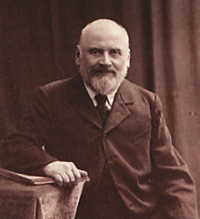
Mily Alexeyevich Balakirev (Russian: Милий Алексеевич Балакирев, Milij Alekseevič Balakirev, 1910) was a Russian pianist, conductor and composer. He is known today primarily for his work promoting musical nationalism in Russia. Working in conjunction with critic Vladimir Stasov, Balakirev brought together the composers now known as the Five, encouraged their efforts and acted as a musical midwife both for them and for Pyotr Ilyich Tchaikovsky.
Balakirev began his career as a pivotal figure in Russian music by extending and developing the fusion began by Mikhail Glinka of traditional Russian and boldly experimental music. In doing so, he established musical patterns that could express overtly nationalistic feeling. He not only demonstrated in his own works how this could be done, but also by taking amateur musicians of prescribed musical education but enormous potential such as Modest Mussorgsky, Alexander Borodin and Nikolai Rimsky-Korsakov, he imparted his own musical beliefs and passed them on to underlie the thinking of his pupils.
Balakirev found himself in an unusual position in his later yers of attending premieres of works he had begun long ago but had only recently completed. For instance, he began writing his First Symphony in 1864 but finished it in 1897. Often, the musical ideas normally associated with Rimsky-Korsakov or Borodin actually originated in Balakirev's compositions. However, his slowness in bringing his works before the public robbed him of credit for his inventiveness. Also, pieces which if completed in the 1860s and 70s would have enjoyed success if they had been performed at that time actually made a much smaller impact when they were introduced toward the end of the composer's life because they had been overtaken by the accomplishments of younger composers. The exception to this is his oriental fantasy Islamey, which is still popular among pianists.
Balakirev began his career as a pivotal figure in Russian music by extending and developing the fusion began by Mikhail Glinka of traditional Russian and boldly experimental music. In doing so, he established musical patterns that could express overtly nationalistic feeling. He not only demonstrated in his own works how this could be done, but also by taking amateur musicians of prescribed musical education but enormous potential such as Modest Mussorgsky, Alexander Borodin and Nikolai Rimsky-Korsakov, he imparted his own musical beliefs and passed them on to underlie the thinking of his pupils.
Balakirev found himself in an unusual position in his later yers of attending premieres of works he had begun long ago but had only recently completed. For instance, he began writing his First Symphony in 1864 but finished it in 1897. Often, the musical ideas normally associated with Rimsky-Korsakov or Borodin actually originated in Balakirev's compositions. However, his slowness in bringing his works before the public robbed him of credit for his inventiveness. Also, pieces which if completed in the 1860s and 70s would have enjoyed success if they had been performed at that time actually made a much smaller impact when they were introduced toward the end of the composer's life because they had been overtaken by the accomplishments of younger composers. The exception to this is his oriental fantasy Islamey, which is still popular among pianists.
Coldplay

Coldplay are a rock band formed in London, England in 1997. The group comprises vocalist/pianist/guitarist Chris Martin, lead guitarist Jonny Buckland, bassist Guy Berryman, and drummer/multi-instrumentalist Will Champion. Coldplay have sold 34.6 million albums, and are also known for their hit singles, such as "Yellow", "The Scientist", "Speed of Sound", "Fix You", "Viva la Vida" and the Grammy Award-winning "Clocks".
Coldplay achieved worldwide fame with the release of their single "Yellow", followed by their debut album, Parachutes (2000), which was nominated for the Mercury Prize. Its follow-up, A Rush of Blood to the Head (2002) won multiple awards such as NME's Album of the Year and was later included on Rolling Stone magazine's 500 Greatest Albums of All Time list, ranking at #473. Their next release, X&Y (2005), received a slightly less enthusiastic yet still generally positive reception. The band's fourth studio album, Viva la Vida or Death and All His Friends (2008), was produced by Brian Eno and released again to largely favourable reviews. All of Coldplay's albums have enjoyed great commercial success.
Coldplay's early material was compared to acts such as Jeff Buckley, U2, and Travis. Coldplay have been an active supporter of various social and political causes, such as Oxfam's Make Trade Fair campaign and Amnesty International. The group have also performed at various charity projects such as Band Aid 20, Live 8, and the Teenage Cancer Trust.
Coldplay achieved worldwide fame with the release of their single "Yellow", followed by their debut album, Parachutes (2000), which was nominated for the Mercury Prize. Its follow-up, A Rush of Blood to the Head (2002) won multiple awards such as NME's Album of the Year and was later included on Rolling Stone magazine's 500 Greatest Albums of All Time list, ranking at #473. Their next release, X&Y (2005), received a slightly less enthusiastic yet still generally positive reception. The band's fourth studio album, Viva la Vida or Death and All His Friends (2008), was produced by Brian Eno and released again to largely favourable reviews. All of Coldplay's albums have enjoyed great commercial success.
Coldplay's early material was compared to acts such as Jeff Buckley, U2, and Travis. Coldplay have been an active supporter of various social and political causes, such as Oxfam's Make Trade Fair campaign and Amnesty International. The group have also performed at various charity projects such as Band Aid 20, Live 8, and the Teenage Cancer Trust.
Nino Rota

Nino Rota (December 3, 1911, Milan – April 10, 1979, Rome) was a world-renowned Italian composer and academic who is best known for his film scores, notably for the films of Federico Fellini and Luchino Visconti. He also composed the music for two of Franco Zeffirelli's Shakespeare films, and for the first two films of Francis Ford Coppola's Godfather trilogy.
During his long career Rota was an extraordinarily prolific composer, especially of music for the cinema. He wrote more than 150 scores for Italian and international productions from the 1930s until his death in 1979—an average of three scores each year over a 46 year period, and in his most productive period from the late 1940s to the mid-1950s he wrote as many as ten scores every year, and sometimes more, with a remarkable thirteen film scores to his credit in 1954. Alongside this great body film work, he composed ten operas, five ballets and dozens of other orchestral, choral and chamber works, the best known being his string concerto. He also composed the music for many theatre productions by Visconti, Zeffirelli and Eduardo de Filippo as well as maintaining a long teaching career at the Liceo Musicale in Bari, Italy, where he was the director for almost 30 years.
During his long career Rota was an extraordinarily prolific composer, especially of music for the cinema. He wrote more than 150 scores for Italian and international productions from the 1930s until his death in 1979—an average of three scores each year over a 46 year period, and in his most productive period from the late 1940s to the mid-1950s he wrote as many as ten scores every year, and sometimes more, with a remarkable thirteen film scores to his credit in 1954. Alongside this great body film work, he composed ten operas, five ballets and dozens of other orchestral, choral and chamber works, the best known being his string concerto. He also composed the music for many theatre productions by Visconti, Zeffirelli and Eduardo de Filippo as well as maintaining a long teaching career at the Liceo Musicale in Bari, Italy, where he was the director for almost 30 years.
Romeo and Juliet
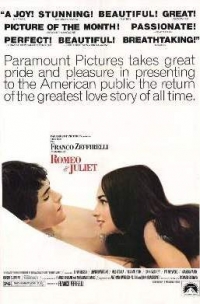
Romeo and Juliet (1968) is a movie adaptation of the William Shakespeare play Romeo and Juliet. The film's tagline is "No ordinary love story…"
The film was directed by Franco Zeffirelli, and stars Leonard Whiting and Olivia Hussey. It won Academy Awards for Best Cinematography and Best Costume Design; it was also nominated for Best Director and Best Picture. Sir Laurence Olivier spoke the film's prologue and epilogue and dubbed the voice of the Italian actor playing Lord Montague, but was never credited in the film.
The film's "love theme", written by Nino Rota, is widely recognized in the UK because of its use by the disc jockey Simon Bates in his "Our Tune" feature. There have been several different versions of the song released in the U.S., the most successful by Henry Mancini, whose instrumental rendition of the theme became a number one hit in the United States in June 1969. There were two different sets of English lyrics to the song. The film's version is called "What Is a Youth", with lyrics by Eugene Walter. An alternate version, called "A Time for Us", featured lyrics penned by Larry Kusik and Eddie Snyder. A third version is called "Ai Giochi Addio" with lyrics by Elsa Morante, and has been performed by opera singers such as Luciano Pavarotti and Natasha Marsh. Josh Groban performed another version titled "Un Giorno Per Noi", an Italian version of "A Time For Us".
The film was directed by Franco Zeffirelli, and stars Leonard Whiting and Olivia Hussey. It won Academy Awards for Best Cinematography and Best Costume Design; it was also nominated for Best Director and Best Picture. Sir Laurence Olivier spoke the film's prologue and epilogue and dubbed the voice of the Italian actor playing Lord Montague, but was never credited in the film.
The film's "love theme", written by Nino Rota, is widely recognized in the UK because of its use by the disc jockey Simon Bates in his "Our Tune" feature. There have been several different versions of the song released in the U.S., the most successful by Henry Mancini, whose instrumental rendition of the theme became a number one hit in the United States in June 1969. There were two different sets of English lyrics to the song. The film's version is called "What Is a Youth", with lyrics by Eugene Walter. An alternate version, called "A Time for Us", featured lyrics penned by Larry Kusik and Eddie Snyder. A third version is called "Ai Giochi Addio" with lyrics by Elsa Morante, and has been performed by opera singers such as Luciano Pavarotti and Natasha Marsh. Josh Groban performed another version titled "Un Giorno Per Noi", an Italian version of "A Time For Us".
Lucio Battisti

Lucio Battisti was an influential Italian singer-songwriter and composer. He is widely recognized for songs that defined the late 1960s and 1970s era of Italian songwriting
Serban Nichifor
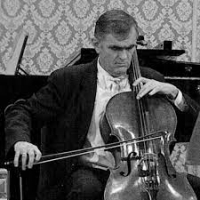
Șerban Nichifor OCB (born 25 August 1954) is a Romanian composer, cellist and music educator.Șerban Nichifor was born on 25 August 1954 to Ermil Nichifor (1916–1997) and Livia Nichifor, née Balint (1922–2017) in Bucharest, Romania. Both his parents were physicians. His father was also a musician and conductor of the Orchestra of Physicians in Bucharest.
Felix Arndt
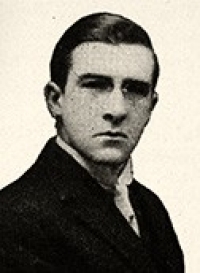
Felix Arndt (May 20, 1889 – October 16, 1918) was an American pianist and composer of popular music. His mother was the Countess Fevrier, related to Napoleon III. His father, Hugo Arndt, was Swiss-born.Educated in New York (his music teachers included Carl Lachmund), Arndt composed songs for the famous vaudeville team of Jack Norworth and Nora Bayes, and recorded over 3000 piano rolls for Duo-Art and QRS Records. He died in New York City from the "Spanish flu" influenza. Arndt is interred at Sleepy Hollow Cemetery, Tarrytown, NY.
Antonio vega
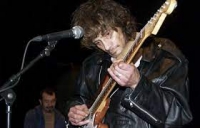
Antonio Vega Tallés (a.k.a. Antonio Vega) (16 December 1957 – 12 May 2009) was a Spanish pop singer-songwriter.He was born in Madrid. In a psychologist test he got 168 of intelligence quotient. He studied at the Liceo Francés de Madrid, where he acted for the first time at aged 14.Antonio Vega has been considered one of the fundamental composers of Spanish pop since the beginning of democracy. The intimacy of his songs and his sensitivity earned him admiration both from public and critics.He was addicted to drugs since the 80s, which over time ceased to be a secret from the public.On 20 April 2009 Antonio Vega was admitted to the Hospital Puerta de Hierro in Madrid with severe pneumonia that forced him to suspend his tour. 51-year old died on 12 May 2009, as a result of lung cancer that had been diagnosed 10 months earlier.
Matthew Fisher
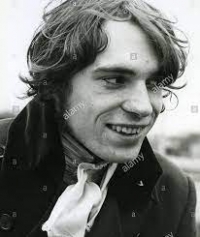
Matthew Charles Fisher is an English musician, songwriter and record producer. He is best known for his longtime association with the rock band Procol Harum, which included playing the Hammond organ on the 1967 single "A Whiter Shade of Pale", for which he subsequently won a songwriting credit.
Josh Groban
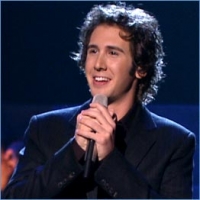
Joshua Winslow Groban (born February 27, 1981) is a Grammy-nominated American singer-songwriter. He has concentrated his career so far mostly in concert singing and recordings, although he has stated that he wishes to pursue musical theater in the future.
Various music critics have described Groban's voice in different ways, with some referring to him as a tenor and others as a baritone. In performance, Groban's music goes as low as G2 (as in the song "To Where You Are") and extends up to at least B4 flat or the B flat above middle C (as heard in "You Raise Me Up"). He also hits a High B during the Baywatch theme song in his Emmy performance of TV Theme Songs on September 21, 2008.This places his voice lower than the tenor range on the low end, and just short of Tenor C, and therefore above the baritone range, on the high end.
Some of Groban's musical influences have been Radiohead, Paul Simon, Sting, Peter Gabriel, and Björk. He says he is able to look up to anyone, musically, who has pushed the boundaries and stepped outside of the box. As for vocal influences, "anyone who told a story with their songs," including Mandy Patinkin, Klaus Nomi, George Hearn, and Luciano Pavarotti.
Various music critics have described Groban's voice in different ways, with some referring to him as a tenor and others as a baritone. In performance, Groban's music goes as low as G2 (as in the song "To Where You Are") and extends up to at least B4 flat or the B flat above middle C (as heard in "You Raise Me Up"). He also hits a High B during the Baywatch theme song in his Emmy performance of TV Theme Songs on September 21, 2008.This places his voice lower than the tenor range on the low end, and just short of Tenor C, and therefore above the baritone range, on the high end.
Some of Groban's musical influences have been Radiohead, Paul Simon, Sting, Peter Gabriel, and Björk. He says he is able to look up to anyone, musically, who has pushed the boundaries and stepped outside of the box. As for vocal influences, "anyone who told a story with their songs," including Mandy Patinkin, Klaus Nomi, George Hearn, and Luciano Pavarotti.
The Verve
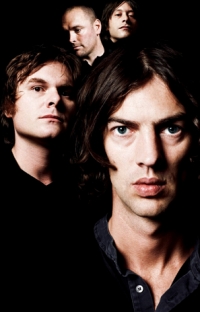
The Verve (originally Verve) are an English rock band formed in Wigan, Greater Manchester in 1989 at Winstanley Sixth Form College, by vocalist Richard Ashcroft, guitarist Nick McCabe, bassist Simon Jones, and drummer Peter Salisbury. Simon Tong later became a member. The band split in April 1999 due to inner conflicts which led to McCabe's departure. The band's original line-up reunited in June 2007. The band embarked on a tour in late 2007 and released Forth in August 2008.
Beginning with a psychedelic sound indebted to space rock and shoegazing, by the mid-1990s the band had released several EPs and two acclaimed records. They also endured name and lineup changes, breakups, health problems, drug abuse and various lawsuits. The band's commercial breakthrough was the album Urban Hymns and its single "Bitter Sweet Symphony", which became a massive worldwide hit. Soon after this commercial peak, the band broke up, citing creative struggles between band members. By then, The Verve had become one of the most influential British alternative rock acts of the decade.
Mike Gee of iZINE said, "...The Verve, as he (Richard Ashcroft) promised, had become the greatest band in the world. Most of the critics agreed with him. Most paid due homage. The Verve were no longer the question mark or the cliché. They were the statement and the definition."
Beginning with a psychedelic sound indebted to space rock and shoegazing, by the mid-1990s the band had released several EPs and two acclaimed records. They also endured name and lineup changes, breakups, health problems, drug abuse and various lawsuits. The band's commercial breakthrough was the album Urban Hymns and its single "Bitter Sweet Symphony", which became a massive worldwide hit. Soon after this commercial peak, the band broke up, citing creative struggles between band members. By then, The Verve had become one of the most influential British alternative rock acts of the decade.
Mike Gee of iZINE said, "...The Verve, as he (Richard Ashcroft) promised, had become the greatest band in the world. Most of the critics agreed with him. Most paid due homage. The Verve were no longer the question mark or the cliché. They were the statement and the definition."
Debussy

Achille-Claude Debussy (August 22, 1862 – March 25, 1918) was a French composer. Along with Maurice Ravel, he is considered one of the most prominent figures working within the field of Impressionist music, though he himself intensely disliked the term when applied to his compositions. Debussy was not only among the most important of all French composers but also was a central figure in all European music at the turn of the twentieth century.
Debussy's music virtually defines the transition from late-Romantic music to twentieth century modernist music. In French literary circles, the style of this period was known as Symbolism, a movement that directly inspired Debussy both as a composer and as an active cultural participant.
Debussy's music virtually defines the transition from late-Romantic music to twentieth century modernist music. In French literary circles, the style of this period was known as Symbolism, a movement that directly inspired Debussy both as a composer and as an active cultural participant.
Joe Cocker
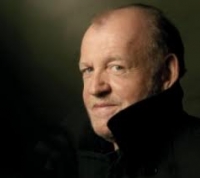
John Robert "Joe" Cocker, OBE (born 20 May 1944) is an English rock/blues musician, composer and actor who came to popularity in the 1960s, and is most known for his gritty voice, his idiosyncratic arm movements while performing, and his cover versions of popular songs, particularly those of The Beatles. He is the recipient of several awards, including a 1983 Grammy Award for his song "Up Where We Belong", a duet which he performed with Jennifer Warnes. He was ranked #97 on Rolling Stone's 100 greatest singers list.
Joe Satriani
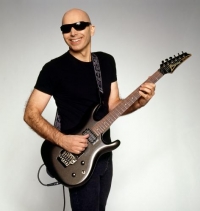
Joseph Satriani (born July 15, 1956) is an American musician, composer, songwriter, and guitar teacher. Early in his career, Satriani worked as a guitar instructor, with many of his former students achieving fame, such as Steve Vai, Larry LaLonde, Rick Hunolt, Kirk Hammett, Andy Timmons, Charlie Hunter, Kevin Cadogan, and Alex Skolnick; he then went on to have a successful solo music career. He is a 15-time Grammy Award nominee and has sold over 10 million albums, making him the biggest-selling instrumental rock guitarist of all time.
Marcel Dupré
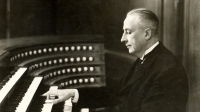
French organist, composer, and pedagogue.Marcel Dupré, foremost French organ virtuoso of his time, famed for his ability to improvise and influential as a teacher. Dupré gave his first organ recital at age .
Ruggero Leoncavallo
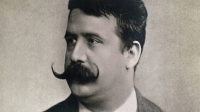
Ruggero Leoncavallo is an opera and operetta composer of the Italian modern era verismo.
Rossetti Cosimo
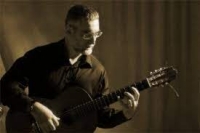
Born in Muensterlingen (Switzerland) in 1965, he devoted himself from early youth to study the accordion at the music school of Konstanz (Germany). He moved to Italy, he continued his studies at the Institute of Musical "Giovanni Paisiello" in Taranto, where he received his diploma in guitar and accordion after graduating from the Conservatory "Niccolò Piccinni" in Bari under the expert guidance of M° Francesco Palazzo.is very active as a composer by performing his songs in concerts in chamber. Were also published several collections for guitar by Edition Carrara of Bergamo, and Publishing MusicAurea Savona.
Enrico Ruggeri

Enrico Ruggeri (born 5 June 1957) is an Italian singer-songwriter.A native of Milan, Ruggeri made his debut in the 1970s with the punk band Decibel. In 1981 he began his solo career and established himself as a songwriter: his most famous success in this latter role is "Il mare d'inverno" ("The Sea in Winter"), brought to chart by Loredana Bertè.He won the Sanremo Music Festival twice: in 1987 with "Si può dare di più" ("You can give more") together with Gianni Morandi and Umberto Tozzi and in 1993 with "Mistero" ("Mystery"). He represented Italy at Eurovision Song Contest 1993 with the song "Sole D'Europa" ("Sun of Europe").In 2016 Ruggeri re-joined the newly reformed Decibel and went on to participate in the 2018 edition of the Sanremo Music Festival. A special performance of their song "Lettera dal Duca" during one of the festival nights featured Midge Ure on vocals and guitar.
Willem Andriessen
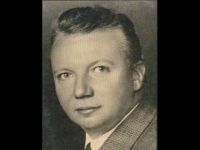
Willem Andriessen was a Dutch pianist and composer. His compositional output was small due to the demands of performance and teaching, but he was nonetheless awarded a number of compositional prizes in Belgium and the Netherlands.
Georges Bizet

Georges Bizet (25 October 1838 – 3 June 1875) was a French composer and pianist of the Romantic era. He is best known for the opera Carmen.
Bizet was born at 26 rue de la Tour d'Auvergne in the 9th arrondissement of Paris in 1838. He was registered with the legal name Alexandre César Léopold Bizet, but he was baptised on 16 March 1840 with the first name Georges, and he was always known thereafter as Georges Bizet. His father Adolphe Armand Bizet (1810-86) was an amateur singer and composer, and his mother, Aimée Léopoldine Joséphine née Delsarte (1814-61), was the sister of the famous singing teacher François Delsarte.
He entered the Paris Conservatory of Music on 9 October 1848, a fortnight before his tenth birthday. His teachers there were Pierre Zimmermann (fugue and counterpoint; often assisted by his son-in-law Charles Gounod), Antoine François Marmontel (piano), François Benoist (organ) and, on Zimmermann's death, Fromental Halévy, whose daughter he himself later married. He won first prizes for organ and fugue in 1855 and completed his earliest compositions.
His first symphony, the Symphony in C, was written in November 1855, when he was seventeen, evidently as a student assignment. It was unknown to the world until 1933, when it was discovered in the archives of the Paris Conservatory library. Upon its first performance in 1935, it was immediately hailed as a junior masterwork and a welcome addition to the early Romantic period repertoire. The symphony bears a stylistic resemblance to the first symphony of Gounod, first played earlier in the same year, and which Bizet had arranged for two pianos although present-day listeners may discern a similarity to music of Franz Schubert, whose work was little known in France at the time the symphony was written.
In 1857, a setting of the one-act operetta Le docteur Miracle won him a share in a prize offered by Jacques Offenbach. He also won the music composition scholarship of the Prix de Rome, the conditions of which required him to study in Rome for three years. There, his talent developed as he wrote such works as the opera buffa Don Procopio (1858-59). There he also composed his only major sacred work, Te Deum (1858), which he submitted to the Prix Rodrigues competition, a contest for Prix de Rome winners only. Bizet failed to win the Prix Rodrigues, and the Te Deum score remained unpublished until 1971. He made two attempts to write another symphony in 1859, but destroyed the manuscripts in December of that year. Apart from this period in Rome, Bizet lived in the Paris area all his life.
Shortly after leaving Rome in July 1860, but while still touring in Italy, he had the idea of writing a symphony in which each of the four movements would be a musical evocation of a different Italian city – Rome, Venice, Florence and Naples. On hearing of his mother's serious illness he cut short his Italian travels and returned to Paris in September 1860; she died a year later. The Scherzo of the symphony was completed by November 1861, but it was not until 1866 that the first version of the whole symphony was written. He subjected it to a number of revisions through to 1871, but died before ever producing what he considered the definitive version. For this reason, the work is sometimes described as "unfinished", but this is an inaccurate description as it was fully scored. It was published in 1880 as the Roma Symphony.
Bizet was born at 26 rue de la Tour d'Auvergne in the 9th arrondissement of Paris in 1838. He was registered with the legal name Alexandre César Léopold Bizet, but he was baptised on 16 March 1840 with the first name Georges, and he was always known thereafter as Georges Bizet. His father Adolphe Armand Bizet (1810-86) was an amateur singer and composer, and his mother, Aimée Léopoldine Joséphine née Delsarte (1814-61), was the sister of the famous singing teacher François Delsarte.
He entered the Paris Conservatory of Music on 9 October 1848, a fortnight before his tenth birthday. His teachers there were Pierre Zimmermann (fugue and counterpoint; often assisted by his son-in-law Charles Gounod), Antoine François Marmontel (piano), François Benoist (organ) and, on Zimmermann's death, Fromental Halévy, whose daughter he himself later married. He won first prizes for organ and fugue in 1855 and completed his earliest compositions.
His first symphony, the Symphony in C, was written in November 1855, when he was seventeen, evidently as a student assignment. It was unknown to the world until 1933, when it was discovered in the archives of the Paris Conservatory library. Upon its first performance in 1935, it was immediately hailed as a junior masterwork and a welcome addition to the early Romantic period repertoire. The symphony bears a stylistic resemblance to the first symphony of Gounod, first played earlier in the same year, and which Bizet had arranged for two pianos although present-day listeners may discern a similarity to music of Franz Schubert, whose work was little known in France at the time the symphony was written.
In 1857, a setting of the one-act operetta Le docteur Miracle won him a share in a prize offered by Jacques Offenbach. He also won the music composition scholarship of the Prix de Rome, the conditions of which required him to study in Rome for three years. There, his talent developed as he wrote such works as the opera buffa Don Procopio (1858-59). There he also composed his only major sacred work, Te Deum (1858), which he submitted to the Prix Rodrigues competition, a contest for Prix de Rome winners only. Bizet failed to win the Prix Rodrigues, and the Te Deum score remained unpublished until 1971. He made two attempts to write another symphony in 1859, but destroyed the manuscripts in December of that year. Apart from this period in Rome, Bizet lived in the Paris area all his life.
Shortly after leaving Rome in July 1860, but while still touring in Italy, he had the idea of writing a symphony in which each of the four movements would be a musical evocation of a different Italian city – Rome, Venice, Florence and Naples. On hearing of his mother's serious illness he cut short his Italian travels and returned to Paris in September 1860; she died a year later. The Scherzo of the symphony was completed by November 1861, but it was not until 1866 that the first version of the whole symphony was written. He subjected it to a number of revisions through to 1871, but died before ever producing what he considered the definitive version. For this reason, the work is sometimes described as "unfinished", but this is an inaccurate description as it was fully scored. It was published in 1880 as the Roma Symphony.
Bart Howard
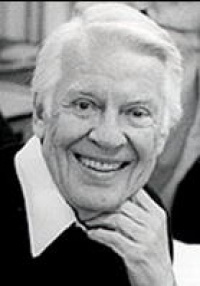
Bart Howard (born Howard Joseph Gustafson; June 1, 1915 — February 21, 2004) was the composer and writer of the famous jazz standard "Fly Me To The Moon", which has been performed by singers (among others) Frank Sinatra, Ella Fitzgerald, Nancy Wilson, Della Reese, Diana Krall, June Christy and Astrud Gilberto. It is also played frequently by jazz and popular musicians around the world.
Howard was born in Burlington, Iowa. He began his career as an accompanist at the age of 16 and played for Mabel Mercer, Johnny Mathis and Eartha Kitt, among others.
"Fly Me To the Moon" was first sung in 1954 by Felicia Sanders at the "Blue Angel" club in Manhattan where the composer became M.C. and accompanist in 1951. The song received wide exposure when Peggy Lee sang it on The Ed Sullivan Show several years later. Bart Howard "lived off" this song for the rest of his life, although he had 49 other songs to his credit.
He died, aged 88, in Carmel, New York. He was survived by a sister Dorothy Lind of Burlington, Iowa and by his companion of 58 years, Thomas Fowler.
Howard was born in Burlington, Iowa. He began his career as an accompanist at the age of 16 and played for Mabel Mercer, Johnny Mathis and Eartha Kitt, among others.
"Fly Me To the Moon" was first sung in 1954 by Felicia Sanders at the "Blue Angel" club in Manhattan where the composer became M.C. and accompanist in 1951. The song received wide exposure when Peggy Lee sang it on The Ed Sullivan Show several years later. Bart Howard "lived off" this song for the rest of his life, although he had 49 other songs to his credit.
He died, aged 88, in Carmel, New York. He was survived by a sister Dorothy Lind of Burlington, Iowa and by his companion of 58 years, Thomas Fowler.
Lifehouse
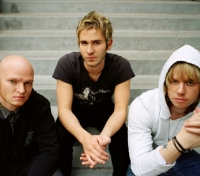
Lifehouse is an American rock band. They came to prominence in 2001 with the hit single "Hanging by a Moment" from their debut major label album, No Name Face. The single won a Billboard Music Award for Hot 100 Single of the Year, beating out Janet Jackson and Alicia Keys for the #1 Single of 2001. In 2002, they released their follow up album Stanley Climbfall. The band's third album, self-titled Lifehouse, was released in 2005. The band released their fourth studio album, Who We Are, on June 19, 2007. The band consists of Jason Wade, Rick Woolstenhulme Jr. and Bryce Soderberg.
Glen Hansard
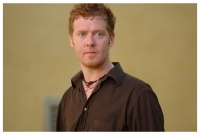
Glen Hansard (born 21 April 1970 in Dublin, Ireland) is the principal songwriter and vocalist/guitarist for Irish rock group The Frames. He is also known for starring in the film Once and co-writing its Academy-Award-winning song, "Falling Slowly."
Metallica

Metallica is an American heavy metal band that formed in 1981 in Los Angeles, California. Founded when drummer Lars Ulrich posted an advertisement in a Los Angeles newspaper, Metallica's original line-up consisted of Ulrich, rhythm guitarist and vocalist James Hetfield, lead guitarist Dave Mustaine, and bassist Ron McGovney. These last two were later replaced from the band, in favor of Kirk Hammett and Cliff Burton, respectively. In September 1986, Metallica's tour bus skidded out of control and flipped, which resulted in Burton being crushed under the bus and killed. Jason Newsted replaced him less than two months later. Newsted left the band in 2001 and was replaced by Robert Trujillo in 2003.
Metallica's early releases included fast tempos, instrumentals, and aggressive musicianship that placed them as one of the "Big Four" of the thrash metal subgenre alongside Slayer, Megadeth and Anthrax. The band earned a growing fan base in the underground music community, and some critics say the 1986 release Master of Puppets is one of the most influential and "heavy" thrash metal albums. The band achieved substantial commercial success with its self-titled 1991 album, which debuted at number one on the Billboard 200. Some critics and fans believed the band changed its musical direction to appeal to the mainstream audience. With the release of Load in 1996, Metallica distanced itself from earlier releases in what has been described as "an almost alternative rock approach", and the band faced accusations of "selling out".
In 2000, Metallica was among several artists who filed a lawsuit against Napster for sharing the band's copyright-protected material for free without the band members' consent. A settlement was reached, and Napster became a pay-to-use service. Despite reaching number one on the Billboard 200, the release of St. Anger in 2003 disappointed some critics and fans with the exclusion of guitar solos, and the "steel-sounding" snare drum. A film titled Some Kind of Monster documented the recording process of St. Anger.
Metallica's early releases included fast tempos, instrumentals, and aggressive musicianship that placed them as one of the "Big Four" of the thrash metal subgenre alongside Slayer, Megadeth and Anthrax. The band earned a growing fan base in the underground music community, and some critics say the 1986 release Master of Puppets is one of the most influential and "heavy" thrash metal albums. The band achieved substantial commercial success with its self-titled 1991 album, which debuted at number one on the Billboard 200. Some critics and fans believed the band changed its musical direction to appeal to the mainstream audience. With the release of Load in 1996, Metallica distanced itself from earlier releases in what has been described as "an almost alternative rock approach", and the band faced accusations of "selling out".
In 2000, Metallica was among several artists who filed a lawsuit against Napster for sharing the band's copyright-protected material for free without the band members' consent. A settlement was reached, and Napster became a pay-to-use service. Despite reaching number one on the Billboard 200, the release of St. Anger in 2003 disappointed some critics and fans with the exclusion of guitar solos, and the "steel-sounding" snare drum. A film titled Some Kind of Monster documented the recording process of St. Anger.
Bruce Springsteen

Bruce Frederick Joseph Springsteen (born September 23, 1949) is an influential American songwriter, singer and guitarist. He has recorded and toured with the E Street Band. Springsteen is widely known for his brand of heartland rock infused with pop hooks, poetic lyrics, and Americana sentiments centered around his native New Jersey. His eloquence in expressing ordinary, everyday problems has earned him numerous awards, including eighteen Grammy Awards and an Academy Award, along with a notoriously dedicated and devoted global fan base. His most famous albums, Born to Run and Born in the U.S.A., epitomize his penchant for finding grandeur in the struggles of daily life. He has sold over 65 million albums in the U.S.
Springsteen's lyrics often concern men and women struggling to make ends meet. He has gradually become identified with progressive politics. Springsteen is also noted for his support of various relief and rebuilding efforts in New Jersey and elsewhere, and for his response to the September 11, 2001 attacks, on which his album The Rising reflects.
Springsteen's recordings have tended to alternate between commercially accessible rock albums and somber folk-oriented works. Much of his iconic status stems from the concerts and marathon shows in which he and the E Street Band present intense ballads, rousing anthems, and party rock and roll songs, amongst which Springsteen intersperses long, whimsical or deeply emotional stories.
Springsteen has long had the nickname "The Boss", a term which he was initially reported to hate but now seems to have come to terms with, as he sometimes jokingly refers to himself as such on stage. The nickname originated when a young Springsteen, playing club gigs with a band in the 1960s, took on the task of collecting the band's nightly pay and distributing it amongst his bandmates.
Springsteen's lyrics often concern men and women struggling to make ends meet. He has gradually become identified with progressive politics. Springsteen is also noted for his support of various relief and rebuilding efforts in New Jersey and elsewhere, and for his response to the September 11, 2001 attacks, on which his album The Rising reflects.
Springsteen's recordings have tended to alternate between commercially accessible rock albums and somber folk-oriented works. Much of his iconic status stems from the concerts and marathon shows in which he and the E Street Band present intense ballads, rousing anthems, and party rock and roll songs, amongst which Springsteen intersperses long, whimsical or deeply emotional stories.
Springsteen has long had the nickname "The Boss", a term which he was initially reported to hate but now seems to have come to terms with, as he sometimes jokingly refers to himself as such on stage. The nickname originated when a young Springsteen, playing club gigs with a band in the 1960s, took on the task of collecting the band's nightly pay and distributing it amongst his bandmates.
Fiona Apple

Fiona Apple (born Fiona Apple McAfee Maggart on September 13, 1977) is a Grammy-winning American singer-songwriter. She gained popularity through her 1996 album Tidal, especially with the single "Criminal", and because of the music video made for it. Her music is fundamentally based on very personal poetic verses, accompanied by often aggressive and progressive production, rooted equally in early jazz, pop, and alt-rock. A supporter of People for the Ethical Treatment of Animals (PETA), Apple is a vegan.
Sergio Caputo
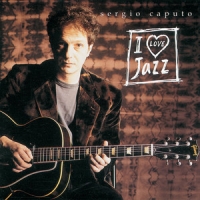
Sergio Caputo is an Italian singer, writer, composer, and guitarist. Caputo's first LP was released in 1983. It presented a style that combined jazz and Latin-jazz pop.
Billy Joel

William Martin Joel (born May 9, 1949) is an American pianist and singer-songwriter. He released his first hit song, "Piano Man", in 1973. According to the RIAA, he is the sixth best-selling recording artist in the United States.
Joel had Top 10 hits in the '70s, '80s, and '90s; is a six-time Grammy Award winner, and has sold in excess of 150 million albums worldwide. He was inducted into the Songwriter's Hall of Fame (Class of 1992), the Rock and Roll Hall of Fame (Class of 1999), and the Long Island Music Hall of Fame (Class of 2006). Joel "retired" from recording pop music in 1993 but continued to tour (sometimes with Elton John). In 2001 he subsequently released Fantasies & Delusions, a CD of classical compositions for piano. In 2007 he returned to recording with a single entitled "All My Life," followed by an extensive "World Tour" from 2006-2008, covering many of the major world cities.
Joel had Top 10 hits in the '70s, '80s, and '90s; is a six-time Grammy Award winner, and has sold in excess of 150 million albums worldwide. He was inducted into the Songwriter's Hall of Fame (Class of 1992), the Rock and Roll Hall of Fame (Class of 1999), and the Long Island Music Hall of Fame (Class of 2006). Joel "retired" from recording pop music in 1993 but continued to tour (sometimes with Elton John). In 2001 he subsequently released Fantasies & Delusions, a CD of classical compositions for piano. In 2007 he returned to recording with a single entitled "All My Life," followed by an extensive "World Tour" from 2006-2008, covering many of the major world cities.
Stephen Flaherty
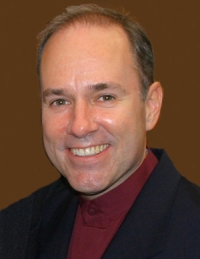
Stephen Flaherty (born September 18, 1960) is an American composer of musical theatre. He works most often in collaboration with the lyricist/bookwriter Lynn Ahrens. They are best known for writing the Broadway shows Once on This Island, which was nominated for eight Tony Awards, Seussical , which was nominated for the Grammy Award and Ragtime, which was nominated for twelve Tony Awards and won Best Original Score. Flaherty was also nominated for two Academy Awards and two Golden Globe Awards with Lynn Ahrens for his songs and song score for the animated film musical Anastasia.
John Dowland
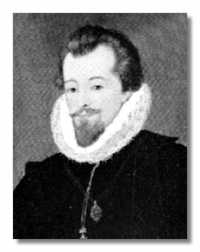
John Dowland (1563 – buried 20 February 1626) was an English composer, singer, and lutenist. He is best known today for his melancholy songs such as "Come, heavy sleep" (the basis for Benjamin Britten's Nocturnal), "Come again", "Flow my tears", "I saw my Lady weepe" and "In darkness let me dwell", but his instrumental music has undergone a major revival, and has been a source of repertoire for classical guitarists during the twentieth century.
 Sheet Music Max is a site for those who wants to access popular sheet music easily,
letting them download the sheet music for free for trial purposes.
It's completely free to download and try the listed sheet music, but you have to delete the files after 24 hours of trial.
Don't forget, if you like the piece of music you have just learned playing,
treat the artist with respect, and go buy the original sheet music.
Sheet Music Max is a site for those who wants to access popular sheet music easily,
letting them download the sheet music for free for trial purposes.
It's completely free to download and try the listed sheet music, but you have to delete the files after 24 hours of trial.
Don't forget, if you like the piece of music you have just learned playing,
treat the artist with respect, and go buy the original sheet music.

